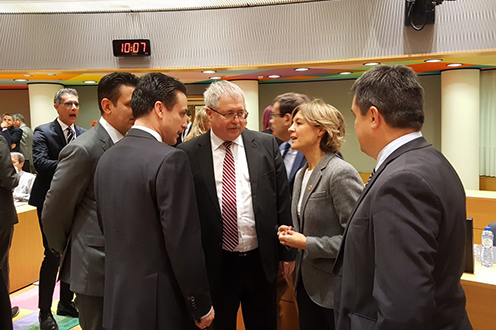Isabel García Tejerina expresses Spain's radical opposition to co-financing of Common Agricultural Policy
News - 2018.1.29
In a statement to the press, Isabel García Tejerina stressed that the Government of Spain is a staunch defender of this policy, as important for Europe as it is for our country. She pointed out that the CAP is the foundation of European construction; it is the policy that gives life to the rural environment and sustains such an important activity as food - "reasons that benefit the European Union as a whole".
For that reason, the minister stressed that the Government of Spain will support the CAP, both in its reform and, prior to that, in defending an important EU budget for this policy. In this regard, Isabel García Tejerina stated, as a red line in this negotiation, Spain's "radical opposition" to the co-financing of the CAP. "We will fight to ensure that, in the future Multiannual Financial Framework, the Common Agricultural Policy continues to be financed, as it has to date, in order to facilitate this activity", she stressed.
In relation to the configuration of the future CAP, Isabel García Tejerina specified that Spain will focus on obtaining responses from the Commission, in particular on issues such as the new model of application. The new model presented by the Commission has a series of benefits in terms of simplification and modernisation, "but Spain requires responses on this issue, and needs to know that the new model will not lead to re-nationalisation, that it will not bring different levels of demands for different European producers, that there will not be delays in future payments and that there will not be problems of financial corrections".
As regards the Commission proposal that Member States should draw up different national strategic plans, which Brussels will subsequently approve, Isabel García Tejerina will ask the Commission for guarantees that these plans do not mean 27 or 28 different 'agricultures'. She clarified that "it is true that each agricultural market is different but we must maintain some connecting links, some minimum common standards that preserve this single market".
In this regard, Isabel García Tejerina pointed out that Europe wishes to have agriculture that responds to the demands of European society and that there are countries that are more and some that are less permissive. "We cannot question the high standards we have reached in food production in Europe", she underlined.
On another note, the minister pointed out that the Council will review the situation of the markets, where there are three products - sugar, pork and powdered skimmed milk - that must be "very closely monitored" in the future, to see the situation in the European Union and ensure that we are not negatively affected.
In the case of the research by the United States into Spanish table olives, Isabel García Tejerina stressed that Spain "will once again refer to the situation of the anti-dumping and anti-subsidy procedures opened by the United States". In regards to the anti-subsidy procedure, the minister recalled that these are subsidies under the Common Agricultural Policy, "and hence the Spanish table olive sector is not being called into question, but rather the CAP as a whole".
For that reason, the minister considers that the Council is the right forum, and furthermore that the Commission is the spokesperson for trade issues with third countries. In this regard, Isabel García Tejerina thanked the Commission for working closely with the Spanish public authorities and with the sector in order to resolve this open issue in a favourable manner.
Non official translation





